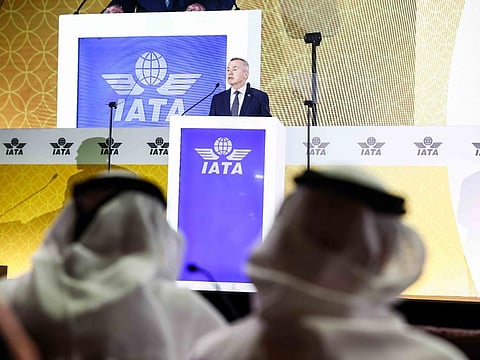Aircraft supply chain issues may persist until 2026: IATA Chief Willie Walsh
Boeing will need years for turnaround, says Emirates President Tim Clark

Dubai: Supply chain issues that have dogged the delivery of new aircraft worldwide could stretch into 2026, according to International Air Transport Association (IATA) Director General Willie Walsh.
"Our assessment is that it's not getting worse, but it's not getting better either,” Walsh said during the IATA annual meeting in Dubai on Sunday. "I see these problems continuing certainly through this year, 2025 and probably into 2026."
Some airline chief executives are "incredibly frustrated” at their inability to get the jets they've ordered into service, and "that is delaying growth plans and growth opportunities that they have," he said.
Boeing Co. and Airbus SE, which control the vast majority of jet manufacturing, have been grappling with supply chain issues like parts and labour that were only exacerbated by the Covid pandemic. The wait time for new jets now stretches into "several months and, in some cases, years," Walsh said.
Asked whether those supply chain headaches take the focus away from other pressing challenges facing the global aviation industry, like achieving net zero carbon emissions by 2050, Walsh said they did not.
"There is still very much a focus on sustainability," he said, noting that the concerns centre around the inadequate supply of sustainable aviation fuel.
Walsh cited France as one example of a stick-like approach that isn't working, with fuel suppliers simply passing on the penalties for not providing enough SAF to airlines.
"It's having zero environmental impact, and it's having a negative economic impact."
Walsh’s comments come ahead of IATA’s annual AGM, which is set to begin on June 3 and will take place until June 4.
Five years for Boeing to recover
Meanwhile, according to Dubai's flagship carrier, Emirates' President Sir Tim Clark, Boeing Co. will need years to emerge from its current crisis.
"For me, this will be a five-year hiatus starting from now. I don't think they will recapture their production line on all aircraft types,” he said.
As a result of the manufacturing issues and delays on new widebody aircraft at the planemaker, Emirates is putting more of its Boeing 777 aircraft through an extensive retrofit program, Clark said. That's raising the cost of that program to about $3.5 billion from previously $2 billion, he said.
Boeing's 777-9 model, of which Emirates has ordered more than 100 units, is about five years late, and Clark said he has "no visibility" on a new time frame, most recently scheduled for mid-2025.
Clark said that Emirates is in no rush to add more Airbus A350 widebodies to its order book. That's after the airline purchased the model only in relatively small numbers at the Dubai Air Show in November because Clark wanted more than the performance of the Rolls-Royce Holdings Plc engines.
"It's a great plane,” Clark said of the A350 model. "But you've got to get it somewhere where you can put your hand on your heart,” about the model's performance.
"And I'm not sure they're in a position to do that right now,” Clark said.
Sign up for the Daily Briefing
Get the latest news and updates straight to your inbox



